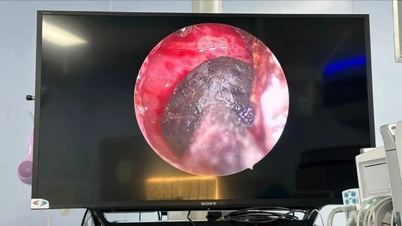The phenomenon of prolonged pain and sensitivity behind the ear when chewing is often overlooked by many people because they think it is not serious. In fact, this can be a 'warning' sign of a problem with the nerves, which needs to be detected and treated promptly.
Ms. NTTT (45 years old, living in Phu Nhuan district, Ho Chi Minh City) is a patient with C7 disc herniation and cervical spondylosis for more than 15 years. When discussing her symptoms, Ms. T. shared that she had previously had a period of pain behind her ears.
“The pain behind the ear is not clearly felt, only when I accidentally touch or press it, or when I eat or chew and have to open my mouth wide can I feel the pain or stinging. But what I feel most clearly is the stiffness behind the head, behind the neck, and swelling of the muscles on both sides of the shoulders. At night, I often have insomnia. When I went to see a doctor, I was told that the blood cannot circulate to the brain because the nerves behind the ear and nape of the neck are blocked.”

Trigeminal neuralgia causes pain from the jaw to the neck, behind the ear
Up to now, Ms. T. said she no longer goes to the doctor or takes medicine because she sees the pain gradually decreasing.
Risk of facial paralysis
According to Master - Doctor Le Ngo Minh Nhu, Ngu Quan Clinic (Ear, Nose, Throat - Eyes), University of Medicine and Pharmacy Hospital, Ho Chi Minh City - Facility 3, the symptom of pain behind the ear can be related to the central nervous system or peripheral nerves such as occipital neuralgia, facial nerve related diseases, trigeminal neuralgia syndrome...
Inflammation and damage of the occipital nerves cause pain and related symptoms. This condition can be the result of occipital nerve compression or muscle tension in the neck, neck or head injury, or other diseases.
“Upper cervical spondylitis, trauma to the greater or lesser occipital nerve, cervical spondylosis causing compression of the occipital nerve or C2/C3 cervical nerve roots, cervical disc disease, tumors compressing the cervical nerve roots, infections... are the causes that can lead to this disease. When infected, patients often have symptoms of pain, burning pain and sharp pain that usually start from the base of the skull, and can spread to the back or along the side of the head,” said Dr. Minh Nhu.
Additionally, pain on one or both sides of the head, pain behind the eyes, sensitivity to light, sensitive scalp (even brushing your hair can increase the pain), and pain when moving the neck are also signs of occipital neuralgia.
Facial nerve related disease (facial paralysis or 7th nerve inflammation): Due to viral infection (such as Herpes simplex), inflammation or compression of the 7th nerve. At this time, the patient will have symptoms of pain or numbness behind the ear before facial paralysis, weakness or more severe paralysis of facial muscles on one side.
Trigeminal neuralgia syndrome : Damage to the mandibular or maxillary branch of the trigeminal nerve can cause pain from the jaw area to the neck and behind the ear. “These pains are often sudden, severe, ‘electric shock’-like, and can radiate to the head, neck, and shoulders,” Dr. Minh Nhu added.

When you have symptoms such as dizziness, fever or prolonged pain in the jaw area behind the ear, you should see a doctor for timely diagnosis and treatment.
Closely related to the head, shoulders, and neck
Ms. Nguyen Hoang Yen Nhi (19 years old, living in Thu Duc City, Ho Chi Minh City) said: "For the past month, I have been having pain in small parts of my head, shoulders, neck, especially the back of my head. Sometimes, the pain starts in the left nape of my neck, then spreads to my temples. A few days later, I discovered that the jaw muscle behind my left ear also hurts and aches when pressed."
Accordingly, each time the pain attacks, Ms. Nhi feels tired, has difficulty concentrating, and has many symptoms of anxiety. Notably, the pain can appear at any time of the day, significantly affecting her work. There was a time when Ms. Nhi even took painkillers continuously, but the pain only temporarily reduced, and a few days later it recurred.
Tingling behind the ear or behind the jaw joint can be related to other pains in the back, head, or neck, as the body's nerve, muscle, and joint structures are closely interconnected.
Dr. Minh Nhu said: “The nerves and muscles behind the ear can cause headaches due to damage to the occipital nerve. The pain is sharp and stabbing from the base of the neck, behind the ear and spreads to the forehead or top of the head. The pain often appears when moving the neck or touching the area behind the ear. In addition, the patient may also have headaches due to muscle spasms in the neck, shoulder and nape, stretching the nerves and muscles behind the ear causing dull pain or tension, which can spread from the area behind the ear to the forehead or temples. These pains are often related to stress or working in the wrong posture for a long time.”
In addition, cervical spondylosis or herniated disc can also compress nerves causing pain from the neck to the area behind the ear, especially when moving the neck or keeping the neck in one position for a long time.
Eventually, TMJ disorders can spread to the neck and cause pain, numbness, or aching behind the ear, in the jaw, and in the temples. This may be accompanied by a feeling of “uneven bite” or pain when chewing or speaking.
Dr. Minh Nhu said that prolonged pain behind the ear without diagnosis and treatment can cause many serious consequences, affecting overall health and quality of life. Accordingly, the disease has the ability to cause long-term nerve damage from chronic pain, increased pain sensitivity, muscle paralysis or loss of sensation, notably affecting other areas of the body as mentioned above.
According to Dr. Minh Nhu, when having the following symptoms, patients should go to a medical facility for examination and treatment:
- Pain that persists or worsens.
- Facial paralysis or weakness.
- Fever, swelling or blisters behind the ear.
- Dizziness, loss of consciousness, or difficulty speaking.
"Currently, there are many treatment methods, including both Western and Eastern medicine. People with symptoms need to be accurately diagnosed and given an appropriate and timely treatment regimen," Dr. Minh Nhu added.
Source: https://thanhnien.vn/bac-si-dau-sau-tai-khi-nhai-khong-nen-dung-thuoc-giam-dau-lien-tuc-185241127113623177.htm


![[Photo] Lam Dong: Images of damage after a suspected lake burst in Tuy Phong](https://vphoto.vietnam.vn/thumb/1200x675/vietnam/resource/IMAGE/2025/11/02/1762078736805_8e7f5424f473782d2162-5118-jpg.webp)
![[Photo] President Luong Cuong receives US Secretary of War Pete Hegseth](https://vphoto.vietnam.vn/thumb/1200x675/vietnam/resource/IMAGE/2025/11/02/1762089839868_ndo_br_1-jpg.webp)





































































































Comment (0)